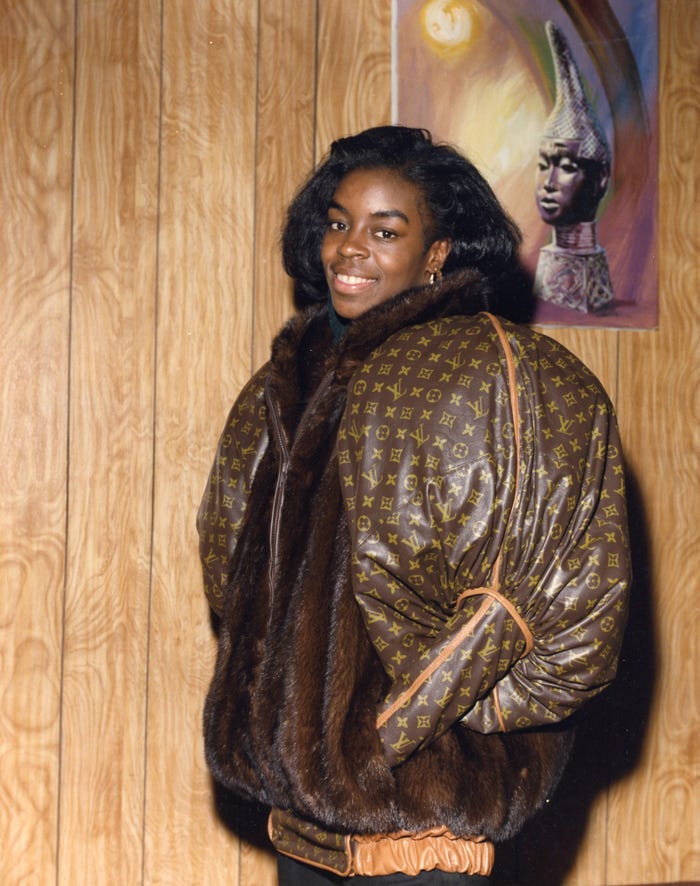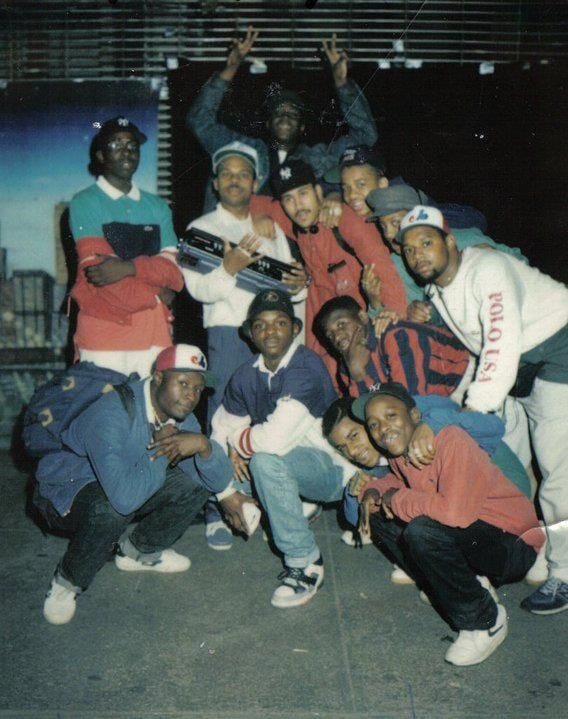What if I told you that luxury is not synonymous with brand names, and that Black people tend to believe this myth due to poverty & lack of exposure?
The internet is currently in a frenzy because Chinese manufacturers are “exposing” that luxury brands make their products in China. I initially thought it was like kids realizing Santa doesn’t exist. However, once the “discourse” and “hot takes” started rolling in, I was tagged in several videos Black creators made on the topic. So, let’s talk about (1) the Black community’s relationship with designer brands and (2) why the internet shouldn’t be clutching pearls over this “news.”
Black folks & Brands
“Everything is in context. My mother used to…she would give us a hard time sometimes, and she would say to us, "I don't know what's wrong with you young people. You think you just fell out of a coconut tree?" You exist in the context of all in which you live and what came before you” - Kamala Harris
We exist in the context of all that came before us.
Take a step back to when “designer brands” entered the cultural zeitgeist. Keep in mind, most designer brands do not have American origins and were eventually brought over. Among other reasons, Ralph Lauren is so iconic because it’s a globally revered American brand and pure Americana. Also why you see a lot of Ralph at events like the Olympics and US Open. It just makes sense. But I digress.
Luxury brands gained prominence because of their revolutionary origins. Chanel’s claim to fame was basically the 1913 version of athleisure, which was unheard of. Hermes introduced the concept of zippers on leather. Louis Vuitton created the first flat trunk, drastically improving travel. But I don’t mean Chanel, Hermes, LV the brand, I mean the literal people. This was very expensive. So as these houses started to expand into America in the early 1900s, it was reserved for celebrities and the upper echelon of society.
Then came the 80s. All about status. The more opulent, the better. Really an iconic time.
At this point, Black Americans have far more social mobility and are able to buy into the ideals of the time. However, given history, achieving these status symbols carried a different meaning of “I made it.” Hip hop / the culture makes luxury its own - think Dapper Dan and Gucci or the Lo Life Crew and Ralph Lauren. Again, iconic.


However, Dapper Dan was pushing counterfeits and the Lo Life Crew was stealing. Luxury is still luxury at this point. There is no “accessible luxury.” Brands used cosmetics to reach aspirational customers rather than watering down the quality of goods (like they do now).
So to sum it all up, in the 80s, we get this belief that:
Luxury brands = “I made it out the hood”
Luxury brands = high quality
This belief still permeates the Black community as if we are frozen in the 80s and 90s. Poverty and exposure join forces here, and bring us to modern-day.
Luxury brands are in the Black community from “top” to bottom, all believing the same thing. (Not really the top, because it’s associated with the bottom. Since multi-generational Black money almost always operates within the Upper Class, it keeps them abreast with the latest permutations in what is deemed luxury. Perhaps we’ll come back to them at a later date.)
If we start at the so-called bottom, it’s all counterfeit. Before you could get two-day shipping on dupes, there was always someone selling fake bags, shoes, whatever. Selling things everyone knows the brand doesn’t even make. It’s very much still in the hood and couldn’t be worse quality, but it’s as close as one might ever get in an impoverished environment. If you can’t have the status, you can at least have proximity to it.
There’s also more subtle truth: the logo is more important than the product. And the quality. But this goes beyond the Black community so we’ll put that on hold for now.
Low-income communities have little to no representation of what it means to have money beyond buying things. The mentality is “make more money so you can buy more stuff” and that’s about it. Like, what else would you do with money? I’ve talked about this in my eBook about why people willingly stay poor. There are a lot of ways you can get the “thing” without ever improving your life circumstances. Abuse rent-a-center, payday loans, Afterpay, shoplifting, etc. Much easier and seems to be the same thing all these other people are getting.
When you have a little disposable income and you can afford small items - fragrances, wallets, maybe an occasional shoe or purse - you feel compelled to get it. When you really move up, you say its to fit in. In fact, the video I was sent that sparked this whole write up said Black women buy designer brands for survival. To prove belonging and be treated accordingly. Exposure does it’s big one here.
Luxury is not in the brand. It’s just the only form of luxury most of the Black community is familiar with.
Undoubtedly, in certain spaces you need to present yourself accordingly. (If you follow me on other platforms, you know I preach this). But luxury just means so much more than brand names. In all of this, no one is looking at custom made goods or that niche store ran by two brothers who handmake everything. The conversations about luxury never discuss how a piece of clothing drapes, crinkles, has that sheen of plastic.
Luxury means LUXURY, but I knew we lost the plot when everyone started peddling that “accessible luxury” nonsense and calling their backyard soap concoction a luxury product. Cut to the chase - real luxury is clear and obvious without any brand association at all. A mink coat perfectly assembled by hand is luxury even if meemaw up the street did it. But the Black community just hasn’t been exposed to this way of thinking about luxury.
For the sake of wrapping this section up and making it plain - if you want intrinsic luxury, you need to be shopping niche, local, and vintage. Take the time to learn about different fabrics and stitching so you can identify when something is well made even if it isn’t affiliated with a brand. Expand your palette beyond the shopping mall and same stores you always go to. Most of all - when you see someone well dressed, ask where they got it. When you focus on luxury over logo, you don’t have to have these meltdowns over what’s being made in China or not.
Before we get to the China factory nonsense, let me be clear for the “THIS IS ANTI-BLACK!!!” crowd. What Black culture has done for fashion is undeniable. There is insane creativity, especially within people who don’t have the means to be platformed. This is no slight to them. My platform helps people understand sociocultural dynamics so they can move accordingly. Ideally to make more money. Some of you want to be broke and anti-capitalist or whatever and that’s not my ministry.
China meltdown
Everything seems like a conspiracy when you don’t know how anything works. People wear designer without understanding luxury goods or the luxury industry. Hence, shocked to find out that companies can’t mass produce goods by hand.
It’s also foolish to believe that the entire luxury goods industry is secretly selling slop. when luxury brands collectively employ thousands of people on creative and development teams, people who likely had to study fashion and luxury and actually care about it.
Now, let’s get to the bottom of this…
There are multiple markets within the luxury industry > products are then made to satisfy that specific market. People who can’t really afford luxury or aren’t interested in luxury beyond brand names are a market. They are almost exclusively getting the lowest quality goods because they don’t care or don’t know better. Not a secret, it’s a very well-known strategy. Why waste vicuña on someone who finds polyester luxurious? Like I said earlier, this group prioritizes logo over product or quality.
Looking at those people who buy plain white t-shirts with Gucci SCREEN PRINTED on it. $620 for a cotton screen printed shirt. An adult making that type of decision will buy a beach house in Idaho if you tell them it’s Fendi and offers payment plans.
Anyway. As you go on from there, there is a ton of intellectual property that comes from brands to manufacturers, like stitching and weight. I’m no expert on this part myself, but you have to create the Birkin for there to be a Birkin dupe. Because of brand specs, the process typically doesn’t stop at manufacturing (should that be in China); there are several steps after that which are tightly controlled by the brand. It is hard to believe for people who buy screen printed t-shirts, but there are people who value that the bag is exactly the right color or that there’s some particular release of the bag with a compelling story behind it.
This group usually won’t just have the big Kahuna of the brand, they have an entire ecosystem of products. When they go to make a purchase, that experience is entirely different. And the experience is worth something to them, too. If you’ve only bought something here and there, you wouldn’t know all the extra stuff they do for key clientele. Additionally, it’s not particularly difficult to find out about the process for the higher-end products. For example, the roses used in Chanel No. 5 have to come from a very specific region in France.
The biggest misconception about ‘rich people wear luxury brands’ is that one person will wear EVERY brand without discrimination. Typically, people have their favorites based on some connection they have with the brand for whatever reason. Even when they hurt me with polyester, I’m loyal to Ralph Lauren because of a backstory from 7th grade (my first time not having to wear a uniform to school, it was the only brand I liked and always fit me perfectly). All of this to say - people pay the cost of these goods not necessarily because they believe it really cost that much to make, but because they find value elsewhere. Honestly, a lot of the value is simply that the poors cant have it.
None of this is defending that brands are raising prices while lowering the quality. We go back to the myth that designer brand = high quality, which simply hasn’t been true for a while (again…the t-shirt…). But the fact that things are made in China just…isn’t the issue people are making it to be.
The last market, perhaps the highest status of them all, is the actual quiet luxury people thought they were talking about. I started to talk about this earlier. You don’t know quiet luxury brands because they’re often very small and regional, incredibly niche, family-owned for generations, and will never mass-produce goods. In any major city, there’s someone running a small shop and personally making every single thing by hand with the best materials they can find. But even if you stumble upon them, you don’t want to pay them because they aren’t a big brand. You’d rather get a dupe from these manufacturers before you buy something without a logo.




Very interesting article. The concept of not everything is for everybody is lost on those with low status and low class who despite buying dupes to look higher status and higher class miss the mark on the value proposition because they lack the social emotional maturity to understand a brand’s niche and their connection to luxury clientele. Luxury brands are a status marker that helps higher status and higher class people locate each other. It’s a subtle form of status checking and even safety checking.